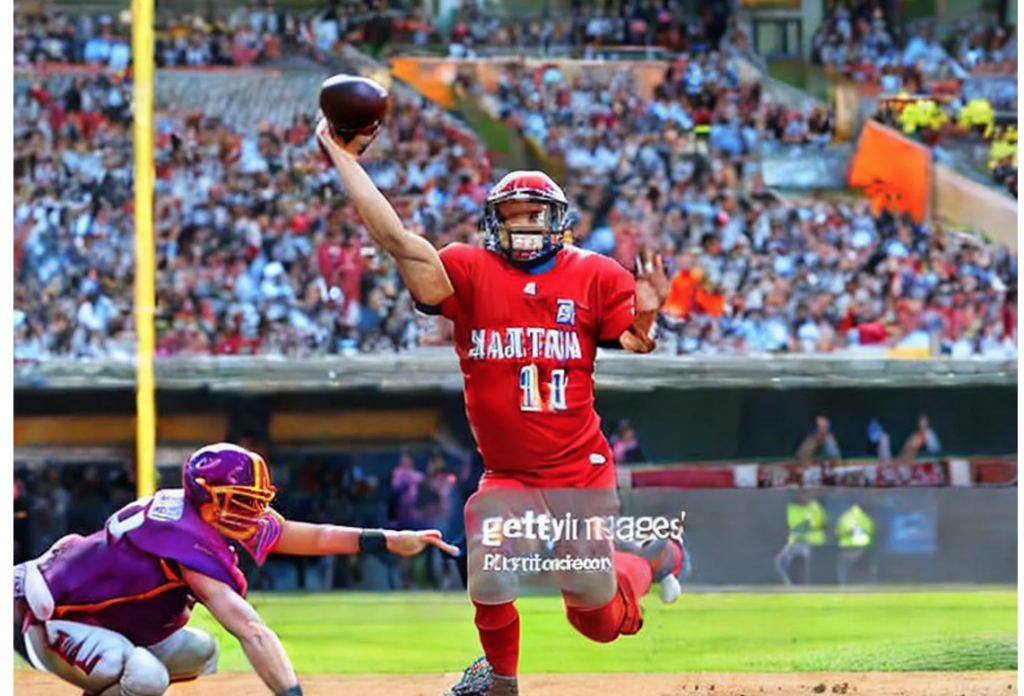
An independent analysis of the dataset found that Getty Images and other stock image sites constitute a large portion of its contents, and evidence of Getty Images’ presence can be seen in the AI software’s tendency to recreate the company’s watermark, as in this example image. (Source: theverge.com/Stability AI)
Getty Images Suit Seeks Agreement with Stability AI—Not Financial Damages
Perhaps the biggest AI news in the last year is a toss-up between chatbot’s writing and algorithms scraping artworks or human images. The news today is that a very large entity has chosen to object to AI scraping and is taking the Stability AI corporation to court.
Getty Images is probably the biggest provider of photos online. Almost every website or news publication relies on Getty Images. And they pay for the right to use them. Stability AI didn’t do that. Keep in mind this legal battle will take place across the pond in the U.K.
In a press statement shared with The Verge, the stock photo company said it believes that Stability AI “unlawfully copied and processed millions of images protected by copyright” to train its software and that Getty Images has “commenced legal proceedings in the High Court of Justice in London” against the firm.
Getty Images CEO Craig Peters told The Verge in an interview that the company has issued Stability AI with a “letter before action” — a formal notification of impending litigation in the UK. (The company did not say whether legal proceedings would take place in the U.S., too.)
The story is breaking this week on theverge.com. and we quote Craig Peters:
“The driver of that [letter] is Stability AI’s use of intellectual property of others — absent permission or consideration — to build a commercial offering of their own financial benefit,” said Peters. “We don’t believe this specific deployment of Stability’s commercial offering is covered by fair dealing in the UK or fair use in the U.S. The company made no outreach to Getty Images to utilize our or our contributors’ material so we’re taking an action to protect our and our contributors’ intellectual property rights.”
First of Several Lawsuits
The article reports that a spokeswoman for Stability AI claimed not to have received any paperwork from Getty Images. Again keep in mind this is happening in UK courts. But the problem is just as large in the United States. The use of generative models has been the subject of several recent stories we shared on Seeflection.com. Those stories mainly involved the use of artworks being scraped by someone’s AI. This is different, according to the CEO Craig Peters.
The lawsuit marks an escalation in the developing legal battle between AI firms and content creators for credit, profit, and the future direction of the creative industries. AI art tools like Stable Diffusion rely on human-created images for training data, which companies scrape from the web, often without their creators’ knowledge or consent. AI firms claim this practice is covered by laws like the U.S. Fair Use Doctrine, but many rights holders disagree and say it constitutes a copyright violation. Legal experts are divided on the issue but agree that such questions will have to be decided for certain in the courts. (This past weekend, a trio of artists launched the first major lawsuit against AI firms, including Stability AI itself.)
Although companies like Stability AI deny any legal or ethical hazard in creating their systems, they have still begun making concessions to content creators. Stability AI says artists will be able to opt out of the next version of Stable Diffusion, for example.
In a recent tweet about the company’s training datasets, Stability AI CEO Emad Mostaque said
“I believe they are ethically, morally and legally sourced and used,” before adding: “Some folks disagree so we are doing opt out and alternate datasets/models that are fully cc.”
When asked what remedies Getty Images would be seeking from Stability AI, Peters said the company was not interested in financial damages or stopping the development of AI art tools, but in creating a new legal status quo (presumably one with favorable licensing terms for Getty Images).
“I don’t think it’s about damages and it’s not about stopping the distribution of this technology,” Peters told The Verge. “I think there are ways of building generative models that respect intellectual property. I equate [this to] Napster and Spotify. Spotify negotiated with intellectual property rights holders — labels and artists — to create a service. You can debate over whether they’re fairly compensated in that or not, but it’s a negotiation based of the rights of individuals and entities. And that’s what we’re looking for, rather than a singular entity benefiting of the backs of others. That’s the long term goal of this action.”
This is just the first shot across the bow for AI corporations that are found using scraping in their machine-learning processes. Stay tuned for the American version of this lawsuit.
The full press statement from Getty Images is included in the article linked below.
read more at theverge.com







Leave A Comment